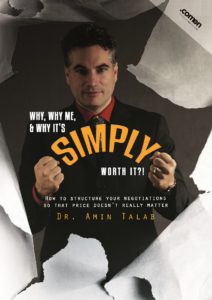You might have experienced the situation:
You are finding yourself talking to a negotiation partner who you have had no chance to establish a trusting relationship with just yet. And, let´s face it, sometimes you never will get that chance. So, coming forward with open questions does not seem to get you anywhere close to where you want to go. You are finding yourself asking them questions like “What is it in my offer you like most?” only to have them ask you back “And what is the best offer you can make me?”
No matter how you seem to phrase your question, they don´t seem to come out with any useful information for you.
What is the actual problem here?
Well, if little or no trust has been established with a negotiation partner, it might be difficult finding out any interests. In fact, this is rather the rule than the exception. And for this reason, I recommend you focus on the relationship and building trust at least in the beginning of the relationship. But let´s say it is to late now for that to happen. You counterpart is being rather nasty with you.
The biggest mistake you can do!
Of course you could just proceed with your argumentation, your product highlights and your offer. However, if you do have no clue about the needs and intentions of the other side, it is a matter of pure luck to hit the right spot if you offer now. So even if it might seem tempting to take a shortcut here and just put together a package with a “convincing” argument (which most people including your competitors do), I strongly advise you to hold back and exercise a little more patience. DO NOT present your best arguments just yet.
So, what can you do?
You do have 2 good alternatives here:
Option 1: Try the indirect track.
Since asking “why” does not produce any good answer, try asking “why not doing/assuming/trying this and that”. To the above mentioned counter question “And what is the best offer you can make me? you should propose one specific offer. Often they want to hear just a number, any number, and are not ready to go into details yet. But make sure they know about your (bad, but not catastrophic) assumptions and thus your option. Then ask “What would be wrong with assuming/doing it this way?”
Example: You are consulting on company retirement schemes, but no useful information is forthcoming apart from the official data like number of employees.
Say: “OK, you are telling me you want to introduce a scheme in your company and want a quick rough estimate for my best offer? [short break, wait for a nod, “yes” or such].
I take you want to include all 800 employees from day one, also the ones that might only stay for a short time. I also assume you are not interested in a bonus scheme to motivate dedicated people to stay with your company. I also guess you need the plan right away and don´t have time for us to outline you the specific tax saving options we´ve hammered out with tax advisories and that could save you up to an extra 30 per cent [this first part has to be said very fast, don´t give him any time, but look up now and see if he is ready to correct you, if not, go on]
…well, to give you a quick ballpark number, that would cost you up to XYZ. However, I might be wrong in some of my assumptions here…? (Stress as question and resist the temptation to speak on!)
Option 2: Find out how much he likes to criticize (you)
Many people are reluctant to disclose their concerns for fear to become the target of criticism themselves. (It is less likely to be criticized if you keep information to yourself). So the trick is to get your counterpart´s criticism out, and the information you need along with it.
Example: You are in an internal budget negotiation and face every increasing conference, training and client duties but are supposed to keep travelling costs the same. You try to find a possibility to negotiation this, so you need background information. Ask “We do have to attend two more conferences, i.e. 25% more next year than we had to last year. What would be so wrong about increasing the budget for travelling to conferences also for 25%. Sounds reasonable, doesn´t it?”
He might let you know “This is impossible also because we just invested a fortune in our new conference and congress system. The board will demand to know why we establish costly IT in several subsidiaries only to find out that travelling expenses continue to rise!”
Bingo: You just established where his interests lie: He is concerned about pressure from the board and having to justify his decision to establish a conference call system. Now you know what to work on: Finding arguments that address these concerns.

